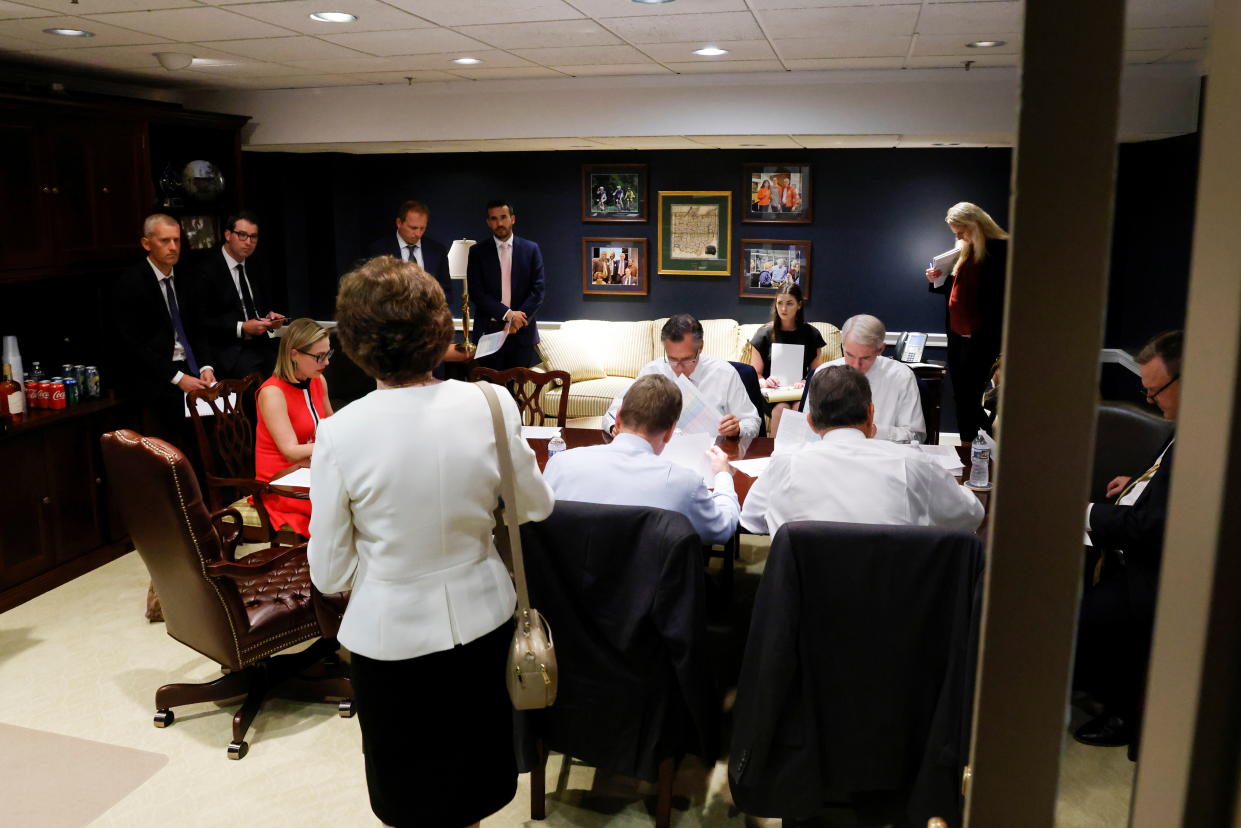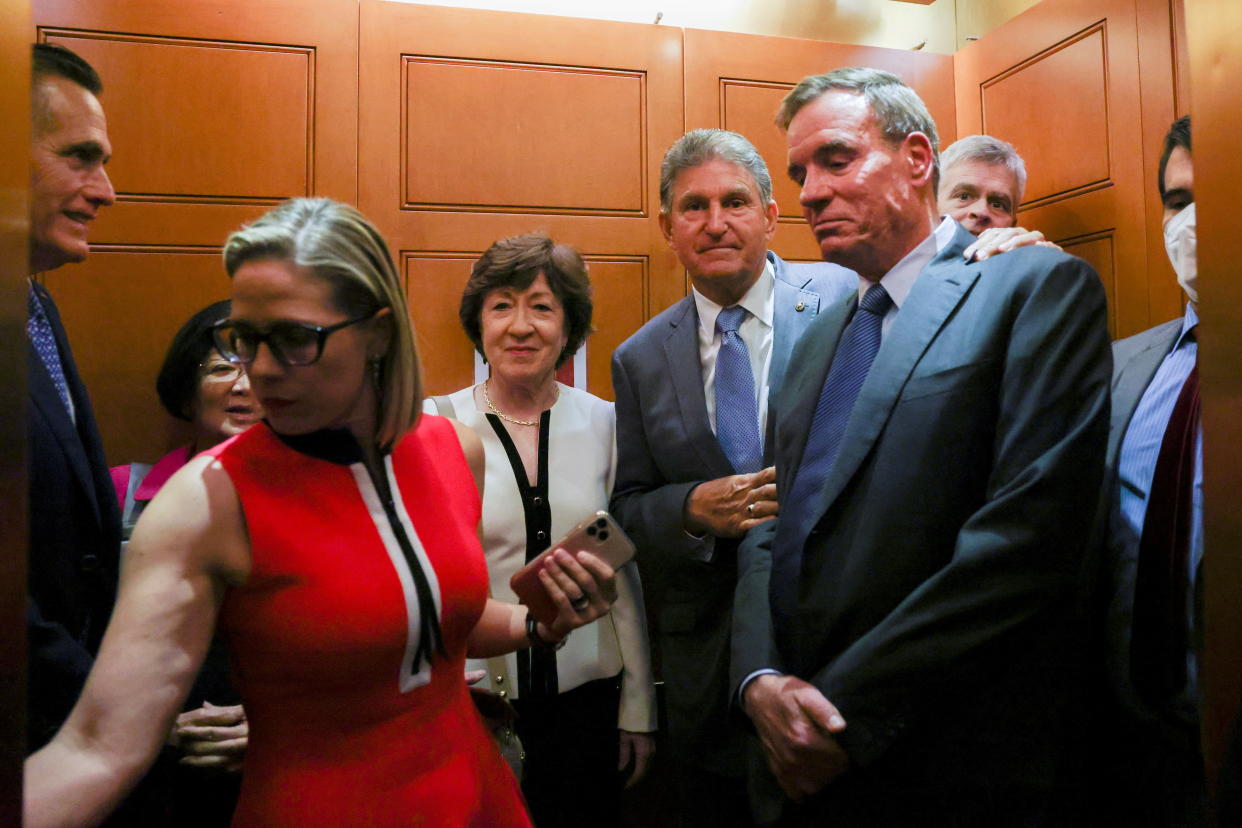Senate group tries one last-ditch attempt at bipartisan infrastructure deal
A group of senators is making a last-ditch attempt at a bipartisan infrastructure bill with a key part of President Biden’s agenda hanging in the balance.
The bipartisan negotiations that include Sens. Joe Manchin, D-W.Va., Kyrsten Sinema, D-Ariz., Susan Collins, R-Maine, and Bill Cassidy, R-La., are the latest bid to come to an agreement on an infrastructure bill, which the White House has made its next major legislative priority.
Cassidy tweeted Tuesday that Biden had called him to discuss the issue, with the senator saying any “infrastructure package should and must be bipartisan.” Sen. Mitt Romney, R-Utah, another member of the group, said Tuesday they had made “good progress.”
The focus on the group follows the announcement Tuesday that the White House had ended a separate set of negotiations with Sen. Shelley Moore Capito, R-W.Va., because the two sides were too far apart. Capito’s offer was hundreds of billions lower than Biden’s initial $2.3 trillion proposal, and after weeks of attempting to find common ground, the White House scuttled the talks.

"[Biden] offered his gratitude to her for her efforts and good faith conversations, but expressed his disappointment that, while he was willing to reduce his plan by more than $1 trillion, the Republican group had increased their proposed new investments by only $150 billion," press secretary Jen Psaki said in a statement.
"After negotiating in good faith and making significant progress to move closer to what the president wanted, I am disappointed by his decision," Capito, who had been empowered to negotiate on behalf of the Republican caucus by Minority Leader Mitch McConnell, said in her own statement.
Sen. John Thune, the Republican Senate whip, said Wednesday that the new group of negotiators are unlikely to attract the 10 GOP votes necessary to overcome a filibuster. “It’s hard for me to see a scenario where even 10 Republicans would vote for something that gets very far beyond where Shelley’s discussions were with the White House,” he said.
Should the latest and likely last set of bipartisan talks on the issue falter, the only path forward for Biden’s infrastructure plan would be to use the process of budget reconciliation, the same tactic used earlier this year to pass the American Rescue Plan with just 50 Democratic votes. Manchin has said he wants the infrastructure bill to be bipartisan, but he made similar comments about the pandemic relief package before eventually coming around to vote for it.

Senate Budget Committee Chair Bernie Sanders, I-Vt., said he is already drafting a reconciliation bill in case the bipartisan talks falter and that he wants to move it “as soon as we can.” House Speaker Nancy Pelosi had previously set the Fourth of July as a deadline to bring the bill to the floor in her chamber. Senate Majority Leader Chuck Schumer said Democrats may pursue a path where part of the bill is bipartisan and the rest is passed via reconciliation.
While Manchin and Sinema have taken much of the focus for holding up the Biden agenda, any single Democratic senator could block the bill from passing if the party turns to reconciliation. On Wednesday, Sen. Martin Heinrich, D-N.M., tweeted, “An infrastructure package that goes light on climate and clean energy should not count on every Democratic vote.” Heinrich is the second Democratic senator this week to express concern that the package might not do enough for climate, following Sen. Sheldon Whitehouse of Rhode Island.
"There is no way Manchin and Sinema are going to cut a deal that represents the view of the caucus," an unnamed Democratic senator said during a closed-door lunch Tuesday, according to a CNN report. "It's just not going to happen."
In his tweet, Heinrich linked to a Politico story in which White House national climate adviser Gina McCarthy said of the infrastructure negotiations, "I think a lot of people have concerns. We have concerns about whether we're going to meet the moment in the kind of bold way in which President Biden knows we have to."
Democrats face similar issues in the House, where their slim majority means a small bloc of legislators of any ideological perspective could torpedo a bill if it does not receive any Republican support.
____
Read more from Yahoo News:


